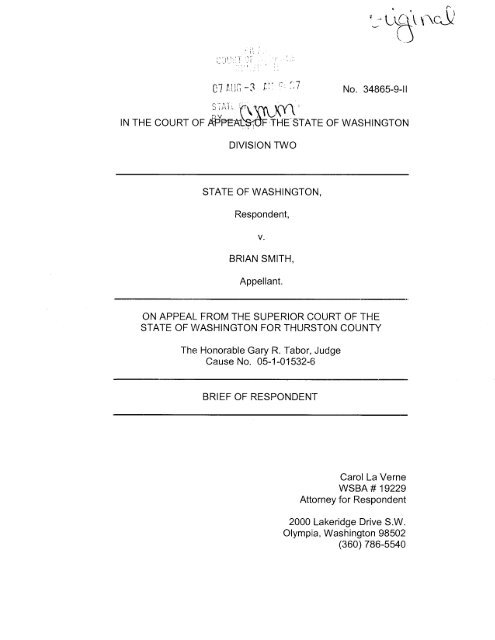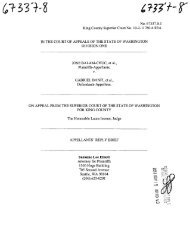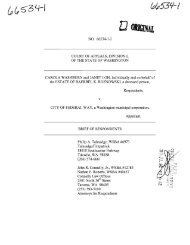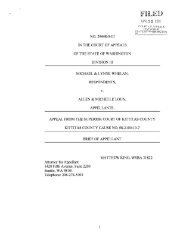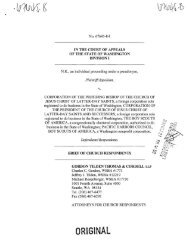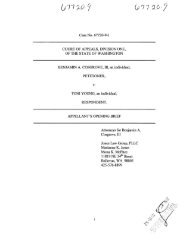Appellant's Brief - Washington State Courts
Appellant's Brief - Washington State Courts
Appellant's Brief - Washington State Courts
You also want an ePaper? Increase the reach of your titles
YUMPU automatically turns print PDFs into web optimized ePapers that Google loves.
DIVISION TWO<br />
STATE OF WASHINGTON,<br />
Respondent,<br />
v.<br />
BRIAN SMITH,<br />
Appellant.<br />
ON APPEAL FROM THE SUPERIOR COURT OF THE<br />
STATE OF WASHINGTON FOR THURSTON COUNTY<br />
The Honorable Gary R. Tabor, Judge<br />
Cause No. 05-1 -01 532-6<br />
--<br />
BRIEF OF RESPONDENT<br />
Carol La Verne<br />
WSBA # 19229<br />
Attorney for Respondent<br />
2000 Lakeridge Drive S.W.<br />
Olympia, <strong>Washington</strong> 98502<br />
(360) 786-5540
TABLE OF CONTENTS<br />
TABLE OF AUTHORITIES.. ................................................... ii<br />
A. ISSUE PERTAINING TO ASSIGNMENT OF ERROR ............... .I<br />
B. STATEMENT OF THE CAE .................................................... 1<br />
C. ARGUMENT .............................................................................. I<br />
1. THE TRIAL COURT DID NOT ERR IN FINDING<br />
THAT THE EVIDENCE ON WHICH THE SEARCH<br />
WARRANT WAS BASED WAS PROPERLY<br />
OBTAINED AND THEREFORE FAILING TO<br />
SUPPRESS THE EVIDENCE SEIZED<br />
PURSUANT TO THE WARRANT. .................................. 1<br />
a. Standard of Review ................................................. 1<br />
b. The Community Caretaking Function Exception.. ............ - 7<br />
c. Challenged Findings of Fact.. ..................................... 10<br />
d. Factors supporting the community caretaking function..l3<br />
e. Search warrant.. ................................................... 15<br />
E. CONCLUSION.. ............................................................ 15
TABLE OF AUTHORITIES<br />
<strong>Washington</strong> <strong>State</strong> Decisions<br />
<strong>State</strong> v . Acrey. 148 Wn.2d 738. 64 P.3d 594 (2003) ................... 2. 4<br />
<strong>State</strong> v . Cardenas. 146 Wn.2d 400. 57 P.3d 1156 ........... 1. 5. 6? 10<br />
<strong>State</strong> v . Duncan. 146 Wn.2d 166. 43 P.3d 51 3 (2002) .............. 1. 5<br />
<strong>State</strong> v . Kinzv. 141 Wn.2d 373. 5 P.3d 668 (2000) ................ 3. 4. 12<br />
Decisions Of The Court Of Appeals<br />
<strong>State</strong> v . Gocken. 71 Wn . App . 267. 857 P.2d 1074 (1 993) .............. 7<br />
<strong>State</strong> v . Johnson. 104 Wn . App . 409. 16 P.3d 680<br />
(2061) ...................................................... 1. 3. 5. 10. 13<br />
<strong>State</strong> v . Lvnd. 54 Wn . App . 18. 771 P.2d 770 (1989) ................ 7. 8<br />
<strong>State</strong> v . Moore. 129 Wn . App . 870. 120 P.3d 635 (2005) .............. 9<br />
<strong>State</strong> v . Villarreal. Jr.. 97 Wn . App . 636. 984 P.2d 1064 ( 4 999) ..... 11<br />
U.S. Supreme Court Decisions<br />
Cadv v . Dumbrowski. 413 U . S . 433. 93 IS . Ct . 2523. 37 L . Ed .<br />
2d 706 (1 973) ............................................................ 3<br />
Terry v . Ohio. 392 U . S. 1. 88 S . Ct . 1868. 20 L . Ed.2d 889 (1 968)<br />
............................................................................... 5<br />
United <strong>State</strong>s Constitution<br />
U.S. CONST . amend . IV ........................................................ 2
A. ISSUE PERTAINING TO ASSIGNMENT OF ERROR.<br />
1. Whether the police lawfully obtained the information<br />
which formed the basis for obtaining the search warrant.<br />
6. STATEMENT OF THE CASE<br />
The appellant has correctly set forth the substantive and<br />
procedural facts of the case.<br />
C. ARGUMENT.<br />
1. THE TRIAL COURT DID NOT ERR IN FINDING THAT<br />
THE EVIDENCE ON WHICH THE SEARCH WARRANT WAS<br />
BASED WAS PROPERLY OBTAINED AND THEREFORE<br />
FAILING TO SUPPRESS THE EVIDENCE SEIZED PURSUANT<br />
TO THE WARRANT.<br />
a. Standard of Review.<br />
An appellate court reviews conclusions of Jaw from an order<br />
pertaining to the suppression of evidence de novo. <strong>State</strong> v.<br />
Duncan, 146 Wn.2d 166, 171, 43 P.3d 51 3 (2002), <strong>State</strong> v.<br />
Cardenas, 146 Wn.2d 400,407,57 P.3d 1156 (2002). When<br />
findings of fact are challenged, an appellate court reviews the<br />
record for substantial evidence to support those findings.<br />
"Substantial evidence is 'a sufficient quantity of evidence . . . to<br />
persuade a fair-minded, rational person of the truth of the finding."<br />
<strong>State</strong> v. Johnson, 104 Wn. App. 409, 414, 16 P.3d 680 (2001).
Warrantless searches are presumed to be unreasonable<br />
unless the <strong>State</strong> can establish that the search comes within a<br />
recognized exception to that rule:<br />
The Fourth Amendment to the United <strong>State</strong>s<br />
Constitution guarantees the "right of the people to be<br />
secure in their persons, houses, papers, and effects,<br />
against unreasonable searches and seizures."<br />
Generally, under the Fourth Amendment, a police<br />
officer's seizure of either evidence of a crime in a<br />
constitutionally protected area or seizure of a crime<br />
suspect must be supported by a judicial warrant<br />
based on probable cause. A warrantless seizure is<br />
therefore presumed unreasonable under the Fourth<br />
Amendment. Nevertheless, it is also well-settled that<br />
this presumption of unreasonableness may be<br />
rebutted by a showing that a specific exception to the<br />
warrant requirement apples in the case under<br />
consideration. "The <strong>State</strong> bears the burden of<br />
showing a seizure without a warrant falls within one of<br />
these exceptions." (Cites omitted.)<br />
<strong>State</strong> v. Acrey, 148 Wn.2d 738, 745-46, 64 P.3d 594 (2003). The<br />
community caretaking function is one of those exceptions.<br />
In this case, the <strong>State</strong> did show that the community<br />
caretaking exception not only permitted, but required, the police to<br />
conduct the search that provided the information on which the<br />
resulting search warrant was based.<br />
b. The Communitv Caretaking Function Exception.<br />
The community caretaking exception to the warrant<br />
requirement, with respect to the Fourth Amendment, was first
announced in Cady v. Dumbrowski, 413 U. S. 433,93 S. Ct. 2523,<br />
37 L. Ed. 2d 706 (1973), and expanded by subsequent <strong>Washington</strong><br />
cases to cover situations involving either emergency aid or routine<br />
health and safety checks. <strong>State</strong> v. Kinzy, 141 Wn.2d 373, 385-86,<br />
5 P.3d 668 (2000). The greater the emergency, the greater the<br />
intrusion permitted. The emergency aid function applies when "(1)<br />
the officer subjectively believed that someone likely needed<br />
assistance for health or safety reasons; (2) a reasonable person in<br />
the same situation would similarly believe that there was a need for<br />
assistance; and (3) there was a reasonable basis to associate the<br />
need for assistance with the place searched." Kinzy, supra, at 386.<br />
Whether the officer acted in an objectively reasonable manner is<br />
"evaluated in relation to the scene as it reasonably appeared to the<br />
officer at the time, 'not as it may seem to a scholar after the event<br />
with the benefit of leisured retrospective analysis. " Johnson,<br />
supra, at 420.<br />
The emergency aid doctrine is different from the exigent<br />
circumstances exception to the warrant requirement in that the<br />
emergency aid doctrine does not involve the investigation of a<br />
crime but aiding persons believed to be in danger of physical harm<br />
or death. Kinzy, supra, at 387. Nevertheless, it will be noted in a
eview of the cases cited herein, the terms "emergency aid",<br />
"community caretaking", "health and safety check", and "exigent<br />
circumstances" are often used loosely, if not interchangeably.<br />
The community caretaking function of the police is of value<br />
to our society and should be protected. It is "based on a service<br />
notion that police serve to ensure the safety and welfare of the<br />
citizenry at large." Acrev, supra. at 748. "Considering the public's<br />
interest in having police officers perform community caretaking<br />
functions, 'police officers must be able to approach citizens and<br />
permissively inquire as to whether they will answer questions."<br />
(Emphasis in original.) Kinzy, supra, at 387-88.<br />
. . . "[Tlhe emergency exception serves an important<br />
purpose: it allows police to carry out their community<br />
caretaking function to protect citizens and property."<br />
pV]e adhere to the federal test. An officer may search<br />
without a warrant when the officer subjectively<br />
believes that someone likely needs assistance for<br />
health and safety reasons, the belief is objectively<br />
reasonable, and the officer has a reasonable basis to<br />
believe that the person needing assistance is in the<br />
place to be searched. (Cite omitted.) If these<br />
requirements are met and the search is not a pretext<br />
for an investigation, no greater protection against an<br />
unreasonable search is needed.
Furthermore, we have recognized two competing<br />
policies in cases where the emergency exception is<br />
invoked: (1) allowing police to help people who are<br />
injured or in danger and (2) protecting citizens against<br />
unreasonable searches. . . In each case, we must<br />
balance these policies in light of the facts and<br />
circumstances. (Cites omitted.)<br />
Johnson, supra, at 417-18.<br />
The courts must balance the individual's interest in freedom<br />
from governmental intrusion against the governmental interests<br />
which justify the intrusion. For example, the <strong>State</strong> interests of<br />
"effective crime prevention and detection and exigent<br />
circumstances" support a reasonable detention under Terry v. Ohio,<br />
392 U .S. 1, 88 S. Ct. 1868, 20 L. Ed.2d 889 (1 968). <strong>State</strong> v,<br />
Duncan, 146 Wn.2d 166, 176,43 P.3d 513 (2002).<br />
In his brief, Smith discusses exigent circumstances,<br />
including the six factors identified by the Cardenas court as those<br />
the court uses in considering whether a warrantless entry was<br />
justified:<br />
(1) the gravity or violent nature of the offense with<br />
which the suspect is to be charged; (2) whether the<br />
suspect is reasonably believed to be armed; (3)<br />
whether there is reasonably trustworthy information<br />
that the suspect is guilty; (4) there is strong reason to<br />
believe that the suspect is on the premises; (5) a<br />
likelihood that the suspect will escape if not swiftly<br />
apprehended; and (6) the entry is made peaceably.
Cardenas, supra, at 406. The issue in that case concerned the<br />
warrantless entry into a motel room occupied by two burglary<br />
suspects, a very different situation than that present in the instant<br />
case. However, the court in Cardenas recognized that police<br />
officers are not obliged to make themselves sitting ducks in an<br />
unknown situation:<br />
Police officers are not "required to proceed at their<br />
peril . . . [it is] unreasonable to expect police officers<br />
to take unnecessary risks in performance of duties."<br />
"[llt is not necessary that every factor be met to find<br />
exigent circumstances, only that the factors are<br />
sufficient to show that the officers needed to act<br />
quickly." Cardenas, supra, at 406, 408.<br />
The trial court in Mr. Smith's case did not find there were<br />
exigent circumstances, but rather that the protective sweep was an<br />
extension of the officers' community caretaking responsibility. (CP<br />
72) Although Officer 1-indros did articulate that the sweep was<br />
partly for the safety of the officers, it was primarily for the protection<br />
of Harold Briggs. (1123106 RP, pgs. 28, 37-38, 43-44.) In either<br />
case, because of the behavior and verbal responses of Taura<br />
Freeman, the officers had reason to be concerned. It would not be<br />
logical to ask police officers io aid and protect persons such as Mr.<br />
Briggs, but then require the officers to leave them in unknown
situations that could potentially be more dangerous than the ones<br />
they were removed from.<br />
When an officer believes in good faith that someone's<br />
health or safety may be endangered, particularly if<br />
that person is known to have physical or mental<br />
problems, public policy does not demand that the<br />
officer delay any attempt to determine if assistance is<br />
needed and offer that assistance while a warrant is<br />
obtained. To the contrary, the officer could be<br />
considered derelict by not acting promptly to ascertain<br />
if someone needed help. (Cite omitted.) So long as it<br />
is undertaken in good faith and is not motivated by an<br />
intent to arrest or search for evidence of a crime, a<br />
warrantless search conducted in order to check on an<br />
individual's health or safety is a valid exception to<br />
constitutional warrant requirements.<br />
<strong>State</strong> v. Gocken, 71 Wn. App. 267, 275, 857 P.2d 1074 (1 993).<br />
In <strong>State</strong> v. Lvnd, 54 Wn. App. 18, 77.1 P.2d 770 (1 989),<br />
Division I discussed what it called the "emergency exception" to the<br />
warrant requirement. In that case, an officer responding to a 91:<br />
hang-up call found Lynd outside his home, loading personal<br />
property into an automobile, with a fresh cut on his face. When<br />
questioned, he told the officer he had argued with his wife, she had<br />
cut him, he had pushed, slapped, and sat on her, and that she had<br />
left the house. He refused permission to look in the home for her<br />
The officer entered without a warrant and discovered evidence not<br />
only of a struggle, but of a marijuana grow operation. Based upon
that information, other officers obtained a search warrant, and Lynd<br />
was charged with possession of marijuana with intent to<br />
manufacture or deliver.<br />
In affirming the conviction, the court held that for a search to<br />
come within the emergency exception:<br />
[I]t must be satisfied that the claimed emergency was<br />
not simply a pretext for conducting an evidentiary<br />
search and instead was "actually motivated by a<br />
perceived need to render aid or assistance." . . . To<br />
that end, the <strong>State</strong> must show that: (1) the searching<br />
officer subjectively believed an emergency existed;<br />
and (2) a reasonable person in the same<br />
circumstances would have thought an emergency<br />
existed. (Cites omitted.)<br />
Whether a police officer's acts in the face of a<br />
perceived emergency were objectively reasonable is<br />
a matter to be evaluated in relation to the scene as it<br />
reasonably appeared to the officer at the time, "not as<br />
it may seem to a scholar after the event with the<br />
benefit of leisured retrospective analysis. (Cites<br />
omitted.)<br />
Lvnd, supra, at 21 -22.<br />
There is not a hint in the entire transcript of the suppression<br />
hearing that the officers used the excuse of a potential danger to<br />
Briggs or the officers themselves as a pretext for the search. They<br />
did not go there on a "knock and talk," they did not go to investigate
a crime, they did not suspect, let alone believe, that there was a<br />
drug operation being conducted in the bedroom of the trailer. In his<br />
brief, at page 15, Mr. Smith acknowledges that the officers had no<br />
information that would indicate any suspects were in the trailer<br />
when they entered; there is no indication of any ulterior motive for<br />
the search. The officers went there to see that Briggs got safely<br />
home. Officer Lindros would have likely called paramedics had<br />
other officers at the scene not been familiar with Briggs and knew<br />
that intoxication was his normal state. (1123106 RP, pgs. 31-32)<br />
<strong>Courts</strong> are to be cautious in applying the community<br />
caretaking function because of the risk of abuse even when the<br />
original intention is good. "'The noncriminal investigation must end<br />
when reasons for initiating the encounter are fully dispelled."' <strong>State</strong><br />
v. Moore, 129 Wn. App. 870, 879, 120 P.3d 635 (2005). In the<br />
case before this court, Officers Anderson and Lindros were<br />
concerned that there might be another person in the trailer who<br />
would not have Harold Briggs' best interests at heart. Officer<br />
Anderson looked into the bathroom and the bedroom, intruding only<br />
long enough to determine that no one was there. The brevity of her<br />
search is underscored by the fact that someone was there and she<br />
failed to see him. (I123106 RP, p. 65) Almost immediately, Harold
Briggs began to regain consciousness and the officers left the<br />
trailer, having dispelled their concerns about his safety.<br />
During the few seconds she had the bedroom door open,<br />
however, Officer Anderson recognized the odor of unburned<br />
marijuana. "Under the open view doctrine, if an officer detects<br />
something by using one or more of his or her senses, while lawfully<br />
present at the vantage point where those senses are used, no<br />
search has occurred." Cardenas, supra, at 408.<br />
c. Challenged Findings of Fact.<br />
Mr. Smith concedes that if Officer Andersor) was lawfully in<br />
the position where she srnelled the marijuana, the search warrant is<br />
valid. He assigns error to four of the trial court's iindings of fact (1,<br />
5, 6, and 7, CP 70-71) and therefore, as Johnson holds, this court<br />
must review the record fsr substantial evidence to support them.<br />
Harold Briggs obviously needed somebody to help him. He<br />
was highly intoxicated, couldn't walk unaided, and, when not being<br />
held upright, he "fell asleep." (I123106 RP, pgs. 18-21) He had not<br />
committed a crime, but the owner of the premises where he was at<br />
the time wanted him removed. (1123106 RP, p. 18) Somebody had<br />
to do something with him, and it would not have been consistent<br />
with the duty of the police to protect the public to have left him
staggering around in traffic. The first Finding of Fact is supported<br />
by the record.<br />
The officers clearly articulated their reasons concern when<br />
they spoke to Taura Freeman. All of the reasons the trial court<br />
listed in Finding of Fact number 5 (CP 71) are in the record.<br />
(1123106 RP, PCJS. 22-24, 28-29, 35-40)<br />
In the sixth Finding of Fact (CP 71) the trial court found that<br />
the officers were reasonably concerned that there might be a<br />
burglary in progress, there might be a trespasser in the trailer, and<br />
that Brigg's safety, as well as their Gwn, might be at risk. Smith<br />
argues that burglars don't usually answer a knock at the door, but<br />
then people don't usually leave their own homes io use the<br />
bathroom in the residence next door. Although at the suppression<br />
hearing Ms. Freeman explained that repairs were being made to<br />
her own batl~room (I123106 RP, p. 53), she did not offer that<br />
explanation to the officers at the time. Any reasonable person<br />
would have believed something was wrong, and it is the job of the<br />
police to investigate when something is wrong. "[Plolice officers<br />
are encouraged to investigate suspicious situations." <strong>State</strong> v.<br />
Villarreal, Jr., 97 Wn. App. 636, 641, 984 P.2d 1064 (1999).
Smith also disputes Finding of Fact number seven, that<br />
Officer Anderson took a quick look through the residence because<br />
of her concerns, momentarily stuck her head inside the doorway of<br />
one room, smelling fresh marijuana, and immediately exiting the<br />
room. This finding is amply supported by the record and Smith fails<br />
to explain why it is not. He argues that Officer Anderson was<br />
conducting a criminal investigation in violation of Kinzy, (<strong>Appellant's</strong><br />
brief, p. 16), but that is not the case. The fact that she discovered<br />
evidence of criminal activity while conducting a protective sweep of<br />
the trailer in order to make sure Harold Briggs was safe did not<br />
convert the search into a criminal investigation. That occurred<br />
later, after the search warrant was obtained.<br />
Smith argues that because certain evidence that could<br />
indicate a burglary was missing, the officers had no reason to be<br />
suspicious. He ignores the evidence that was present, specifically<br />
Ms. Freeman's odd behavior. This is much like saying a person<br />
with a fever, nausea, and a headache isn't sick because he doesn't<br />
have a cough.<br />
Smith claims there was no evidence that Mr. Briggs was in<br />
need of assistance, other than perhaps an aspirin later for the<br />
inevitable hangover. Harold Briggs could not walk unassisted, had
difficulty speaking, was barely conscious when being held upright,<br />
and passed out immediately upon being placed on the couch.<br />
Officers were unable to rouse him enough to find out if Ms.<br />
Freeman was permitted to be in the trailer. (I123106 RP, pgs. 19-<br />
21, 23, 2735-36). He obviously was in no condition to protect<br />
himself if there was, in fact, someone in the trailer who would harm<br />
him or take his property. He may not have been in danger of dying<br />
from the alcohol, but he wasn't able to tend to his own physical<br />
needs, either. The trial court was correct in finding that the officers<br />
acted appropriately.<br />
d. Factors supporting the community caretaking function.<br />
The facts in this case amply support the trial court's findings<br />
of fact, as well as the factors underlying the emergency aid<br />
exception, as set forth in Johnson, supra, at 415. Johnson includes<br />
the emergency exception in the community caretaking function.<br />
(1) The officer subjectively believed that someone likely<br />
needed assistance for health or safety reasons. The officers who<br />
had to physically help Harold Briggs walk into his trailer<br />
subjectively believed he needed assistance for both health and<br />
safety reasons.
(2) A reasonable person in the same situation would have<br />
similarly believed that there was a need for assistance. The<br />
evidence of Mr. Briggs' extravagant intoxication would convince any<br />
reasonable person that he needed assistance.<br />
(3) There was a reasonable basis to associate the need for<br />
assistance with the place searched. The officers were with Mr.<br />
Briggs and Ms. Freeman in a very small trailer. Ms. Freemap<br />
seemed nervous, offered a peculiar explanation for her presence<br />
there, positioned herself to block the hallway, and kept looking over<br />
her shoulder down the hallway. The officers could reasonably<br />
assume that if there was a danger, it was down the hallway. Officer<br />
Anderson looked into the bathroom and the back bedroom only<br />
long enough to ascertain (incorrectly, as it turned out) that no other<br />
person was there. She did not search closets, drawers, or any<br />
containers. She limited the scope and duration of the search to the<br />
location where the danger might be, and the time it would take to<br />
dispel any suspicion. When she had done so, and Mr. Brigg roused<br />
himself sufficiently to give permission for Ms. Freeman to be there,<br />
the officers left the trailer.<br />
record.<br />
The trial court's Findings of Fact are amply supported by the
e. Search warrant.<br />
Mr. Smith implicitly acknowledges that if the information in<br />
the affidavit on which the search warrant was granted was<br />
sufficient. If that information was properly obtained, then the<br />
search warrant is valid. That is indeed the case.<br />
D. CONCLUSION<br />
There is ample evidence to support the trial courts Findings<br />
of Fact and Conclusions of Law resulting from the suppression<br />
hearing. The <strong>State</strong> respectfully asks this court to affirm the<br />
appellant's convictions for Unlawful Possession of<br />
Methamphetamine with Intent to Deliver, Unlawful Possession of<br />
Oxycodone, Unlawful Possession of Hydrocodone, Unlawful<br />
Possession of Clonazepam with Intent to Deliver, and Unlawful Use<br />
of Drug Paraphernalia.<br />
Respectfully submitted this id of &r,yf , 2007<br />
h & n c<br />
Carol La Verne, WSBA# 19229<br />
Attorney for Respondent
BRIAN SMITH,<br />
COURT OF APPEALS, DIVI<br />
OF THE STATE OF<br />
NO. 34865-9-11<br />
STATE OF WASHINGTON,<br />
Respondent,<br />
VS.<br />
STATE OF WASHINGTON )<br />
) ss.<br />
COUNTY OF THURSTON )<br />
Appellant.<br />
CERTIFICATE OF MAILING<br />
I, Jamie Keserich, hereby state under penalty of perjury, that I am over the<br />
age of 18 years and competent to be a witness in the above-entitled cause, that on<br />
the 2nd day of August, 2007,I caused to be mailed to the <strong>Appellant's</strong> Attcmey<br />
Thomas E. Doyle, a copy of <strong>Brief</strong> of Respondent, by depositing same in the<br />
United <strong>State</strong>s mail at Olympia, <strong>Washington</strong>, addressed as follows:<br />
THOMAS E. DOYLE<br />
ATTORNEY AT LAW<br />
PO BOX 510<br />
HANSVILLE, WA 98340-05 10<br />
I hereby swear under penalty of perjury under the laws of the <strong>State</strong> of<br />
<strong>Washington</strong>, that the abovq is true and correct.<br />
" 4<br />
Signed this day of August, 2007, at Olympia, <strong>Washington</strong>.<br />
~i@ie Keserich<br />
dgal Assistant<br />
-


